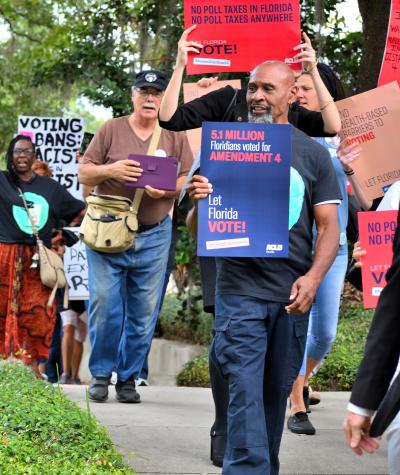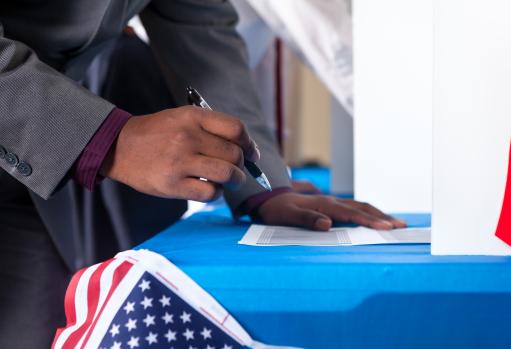A three-judge panel in the U.S. Court of Appeals for the Eleventh Circuit affirmed a decision by a federal district court in Jones v. DeSantis, which found that it was unconstitutional for Florida to deny people with past felony convictions the right to vote based on their inability to pay legal financial obligations (LFOs) – the fines, fees, and restitution imposed by the court.
On February 19, in a unanimous decision, the three-judge panel of the Eleventh Circuit upheld the district court’s preliminary injunction, which blocked enforcement of a Florida law that sought to condition voting rights restoration for returning citizens on the payment of LFOs. That order, which the district court issued in October 2019, gave the state specific instructions with respect to allowing the individual plaintiffs in this case to register.
So what does that mean for the hundreds of thousands of Floridians with past felony convictions who still owe LFOs?
Even though the district court’s order only specifically directed the Florida Secretary of State and county supervisors of elections to allow the 17 individually named plaintiffs who brought the lawsuit to register and vote, the Eleventh Circuit confirmed the constitutional principle that requiring payment of LFOs as a condition of voting is unconstitutional, and can’t be applied to those who are genuinely unable to pay.
A state may not treat criminal defendants more harshly on account of financial hardship, and may not continue to punish people with past convictions solely because of their inability to pay LFOs while simultaneously reenfranchising those who can afford to pay.
Now, with two courts having reached that same conclusion, it is incumbent upon the State of Florida to ensure that it complies not only with the specific directives of the district court’s preliminary injunction, but also with the broader constitutional principles that form the foundation of those rulings.
Both the district court’s order and the Eleventh Circuit’s opinion make clear that it is Florida’s responsibility to make sure that state and county election officials comply with the constitutional principles articulated by both courts. The state, however, continues to insist that these rulings apply only to the individual Floridians who are participating in this lawsuit.
But that approach directly contradicts the Eleventh Circuit’s ruling, which clearly says that “[t]o comply with the legal principle behind the injunction, the state need only make a good faith effort to ensure that no felon otherwise eligible to vote under Amendment 4 is prevented from doing so because of his or her genuine inability to pay LFOs.”
And there’s no reason that compliance with these principles should be burdensome for the state – in fact, the Eleventh Circuit specifically said that the district court’s order “leaves the State ample discretion in designing the procedure to be used to provide an opportunity for these plaintiffs (and others) to demonstrate their indigency and inability to pay for reasons beyond their control.”
Unfortunately, the state has shown little interest in establishing such a procedure. Instead, Governor Ron DeSantis and Secretary of State Laurel Lee have chosen to spend their time and resources arguing that the constitution’s protections against wealth discrimination in voting mean that Amendment 4 should be invalidated in its entirety.
In fact, they have already requested to have the panel’s decision reheard by the entire Eleventh Circuit. Rather than taking any steps to ensure that all Floridians are able to exercise their fundamental constitutional right to vote, the State of Florida is instead attempting to nullify the will of over five million Florida voters who voted to restore their fellow citizens’ voting rights.
Instead, Florida should take immediate steps to ensure that no Floridian is denied their right to vote solely because of their inability to pay outstanding LFOs. With elections coming up in less than a month, it’s the state’s responsibility to ensure that every eligible voter is able to cast their ballot and have it counted.
In the meantime, there are several remaining legal claims challenging SB7066 that have not yet been addressed by the courts. A trial on all the remaining legal claims is scheduled to begin Monday, April 6, at the district court in Tallahassee, FL. CLC and our partners will be there to defend the voting rights of our clients and every Florida voter.
Learn more about our clients Lee Hoffman and Bonnie Raysor.


